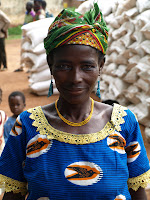The rainy season of 2007 was disastrous for the Northern Regions of Ghana. Widespread droughts followed by torrential rains caused the dams in Burkina Faso to overflow; the resulting deluge covered most of the region, and put acres of farms, homes, belongings and lives under 10 feet of water. The majority of the East Mamprusi district—subsistence farmers all—had their harvest and their topsoil washed away with their belongings, leaving them with nothing to eat, and nothing in which to grow anything new. The UN-funded World Food Program asked PARED to facilitate the distribution of food aid to the thousands in the district that would qualify as beneficiaries. I know that PARED, as a development organization that believes Africa can feed herself, doesn't support the concept of food aid on principle. I also know they agreed because increasing numbers of skinny legs and distended stomachs were meeting them in the rural villages we serve.
The sheer numbers of people lining up to collect these staple grains are staggering. My counterpart Sidik processes each one, finding their name on a 40-page list-by-community, and recording their presence with a purple-inked thumbprint. The large white bags of Ghanaian-grown maize and Burkinabe beans waiting to be taken away are stacked behind the office girls, an 8 foot high wall of sandbags against the flood of human hunger rising steadily as the time since the last successful harvest lengthens into 2 years. I look around me into the faces of the Ghanaians waiting to recieve, and recognize people I've met in Zambulugu, the La-atarigu blacksmith and his wife, the dry-season farmer from Gbandaa who gave me my first cassava. Almost the entire population of Sumniboma is there; I am greeted excitedly by 10 and 20 people at a time, all sporting broad smiles, all inquiring after my health, and when I will visit next. The sunny and friendly Ghanaian temperment is nigh-unquenchable, it seems, even as they stand in lines in a gesture tantamount to the admission that they are slowly starving.
We talk about the rains, and “how much better they are”. They never say what they are better than; it goes acknowledged without being stated. It is much better this year than last-- and every time I see the clouds roll in, I hope that the earth can swallow the worst of the sean's deluge still to come.

.jpg)

1 comment:
Hi Ashley - great blog - we are forming an association of bloggers in Ghana and it would be great if you and your colleagues joined. If you're interested, let me know: holli@shiloh410.com
I'm a Canadian who moved to Ghana 12 years ago... and I'm still here! Check out my blog about life here as well if you have time:
http://www.hollisramblings.blogspot.com
And good luck!
Cheers
Post a Comment